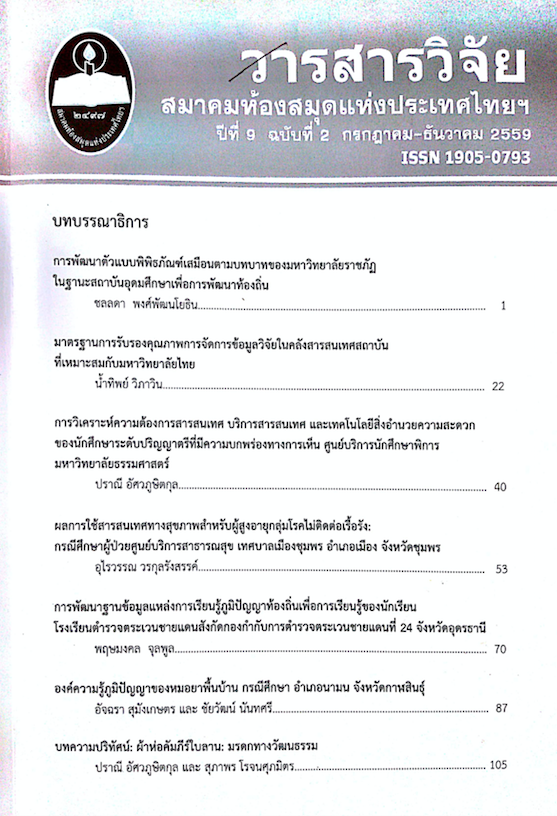องค์ความรู้ภูมิปัญญาของหมอยาพื้นบ้าน กรณีศึกษา อำเภอนามน จังหวัดกาฬสินธุ์
Main Article Content
Abstract
การวิจัยครั้งนี้มีวัตถุประสงค์เพื่อศึกษาบริบทและการจัดเก็บข้อมูลภูมิปัญญาของหมอยาพื้นบ้าน อำเภอนามน จังหวัดกาฬสินธุ์ กลุ่มตัวอย่างเป็นหมอยาพื้นบ้านในเขตอำเภอนามน จังหวัดกาฬสินธุ์ จำนวน 45 คน โดยเลือกแบบเจาะจง มีแบบแผนการวิจัยเชิงสำรวจ (Survey Research) ผลการศึกษาพบว่า สภาพปัจจุบันหมอยาพื้นบ้านเป็นเพศชายมากกว่าเพศหญิง โดยคิดเป็นร้อยละ 55.6 หมอยาพื้นบ้านแบ่งได้ 6 ประเภท ได้แก่ หมอเป่า หมอตำแย หมอสมุนไพร หมอสูตรขวัญ หมอนวด และหมอธรรม หมอยาพื้นบ้านบางท่านมีความสามารถที่หลากหลาย หมอยาพื้นบ้านต่างก็มีองค์ความรู้ในการรักษาโรคชนิดเดียวกันในวิธีที่แตกต่างกันทั้งนี้ขึ้นอยู่กับความรู้ที่ได้รับการสืบทอดและศึกษาเรียนรู้ด้วยตัวเอง ซึ่งส่วนใหญ่สืบทอดองค์ความรู้มาจากบรรพบุรุษ ในกระบวนการรักษาใช้ทรัพยากร ความเชื่อ และพิธีกรรมภายในชุมชนเป็นหลักผสมผสานการใช้สมุนไพร สมุนไพรที่ใช้ในการรักษาโรคเป็นสมุนไพรพื้นถิ่นที่เก็บได้จากธรรมชาติ และปลูกเอง มีจำนวน 72 ชนิด ลักษณะของสมุนไพรที่ใช้มีหลายรูปแบบ อาทิ ยาผง ยาลูกกลอน น้ำมันสกัด ยาหม้อหรือยาต้ม และการประคบองค์ความรู้ของหมอยาพื้นบ้านเหล่านี้ไม่ได้ใช้เพียงเพื่อรักษาความเจ็บป่วยเท่านั้นแต่มีคุณค่าต่อสุขภาพทั้งร่ายกายและจิตใจ ปัจจุบันหมอยาพื้นบ้านไม่ได้มีการถ่ายทอดองค์ความรู้ให้แก่ลูกหลานหรือคนอื่น ๆ เพราะคนทั่วไปให้ความสำคัญกับการแพทย์แผนปัจจุบัน จนอาจละเลยภูมิปัญญาด้านการรักษาของหมอยาพื้นบ้า
Knowledge and wisdom of folk healers in Namon district, Kalasin Province
This study aims to examine the context as well as collect the data on the wisdom of folk healers in Namon district, Kalasin province. The study population is 45 folk healers in Namon district, Kalasin province, selected by purposive sampling for a survey research. The study found that currently there are more male folk healers (55.6%) than female ones. There are 6 types of folk healers; magic speller, midwife, herbalist, religious healer, massager and sorcerer. Some healers are multi-talented of illness. Each healer has his/her own knowledge in healing a particular illness, which might be different from other healers. This is due to the knowledge they inherit and their self-learning. Most of them inherit knowledge from their ancestors. Their healing process mostly involves resources, belief and rite in the community, along with the use of herbs. They grow the herbs themselves as well as pick from nature. There are altogether 72 types of herbs transformed into various patterns such as powder, ball, distilled oil, boiling liquid and herb ball. The wisdom of these folk healers aims to heal not only illness, but also mind and soul. Currently, folk healers no longer pass on their knowledge to their children because most people focus on current medicine so highly that they ignore wisdom of local doctor in community.
Article Details
บทความทุกเรื่องที่ลงตีพิมพ์จะได้รับการตรวจอ่านโดยผู้ทรงคุณวุฒิ ความคิดเห็นและบทความที่ปรากฏในวารสารนี้ เป็นของผู้เขียนซึ่งมิใช่เป็นความคิดเห็นของคณะผู้จัดทำ และมิใช่ความรับผิดชอบของสมาคมห้องสมุดแห่งประเทศไทยฯ การนำบทความในวารสารนี้ไปตีพิมพ์ซ้ำต้องได้รับอนุญาตจากคณะผู้จัดทำ
All articles submitted for publication will be reviewed by the academic reviewers. The editorial board and TLA claim no responsibility for the content or opinions expressed by the authors of individual articles or columns in this journal. Reprinting of any articles in this journal must be permitted by the editorial board.


